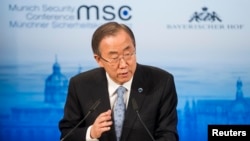UNITED NATIONS —
U.N. Secretary-General Ban Ki-moon has urged the international community to intensify efforts to help the people of the Central African Republic, where he warned the situation is worsening. His remarks come as France announced it would temporarily increase its small troop presence in the CAR.
Inter-communal attacks and reprisals by mostly Muslim Seleka fighters and largely Christian anti-Balaka fighters have killed thousands and left nearly one million people displaced or as refugees in neighboring countries.
More than half the CAR's population has been affected by the crisis and are in need of aid.
The sectarian nature of the violence, in a country that had previously not seen open religious tensions, has been of particular concern.
On Friday, U.N. chief Ban Ki-moon expressed his concern to the Security Council about the cycle of revenge and reprisal attacks. He said entire Muslim communities are now fleeing for their lives.
“The dark clouds of mass atrocities and sectarian cleansing loom over the Central African Republic. Public lynchings, mutilations, and other horrendous acts of violence are spreading mayhem and fear. All Central Africans have been victims, Muslims and Christians alike," said Ban Ki-moon.
He said the local Red Cross had reported finding a mass grave in the capital, Bangui. He noted that public records are being deliberately destroyed and citizens and officials are raising tensions through hate speech.
The African Union has deployed about 5,000 peacekeepers to the country, assisted by a force of 1,600 from France. Paris announced Friday it would temporarily increase its force by an additional 400 troops and police.
The European Union has also pledged to send at least 500 troops to protect civilians in the CAR EU Foreign Policy Chief Catherine Ashton told reporters after the Council meeting, which she also briefed, that the EU has commitments for closer to 1,000 troops. It was not clear how soon they could start to deploy.
It is becoming more likely that the United Nations will take over the African-led mission in the coming months, turning it into a full-fledged U.N. peacekeeping force. That would provide the troops with stable financing and more equipment, among other benefits.
Ban said he would return to the council on Tuesday with his recommendations for containing and ending the crisis.
Inter-communal attacks and reprisals by mostly Muslim Seleka fighters and largely Christian anti-Balaka fighters have killed thousands and left nearly one million people displaced or as refugees in neighboring countries.
More than half the CAR's population has been affected by the crisis and are in need of aid.
The sectarian nature of the violence, in a country that had previously not seen open religious tensions, has been of particular concern.
On Friday, U.N. chief Ban Ki-moon expressed his concern to the Security Council about the cycle of revenge and reprisal attacks. He said entire Muslim communities are now fleeing for their lives.
“The dark clouds of mass atrocities and sectarian cleansing loom over the Central African Republic. Public lynchings, mutilations, and other horrendous acts of violence are spreading mayhem and fear. All Central Africans have been victims, Muslims and Christians alike," said Ban Ki-moon.
He said the local Red Cross had reported finding a mass grave in the capital, Bangui. He noted that public records are being deliberately destroyed and citizens and officials are raising tensions through hate speech.
The African Union has deployed about 5,000 peacekeepers to the country, assisted by a force of 1,600 from France. Paris announced Friday it would temporarily increase its force by an additional 400 troops and police.
The European Union has also pledged to send at least 500 troops to protect civilians in the CAR EU Foreign Policy Chief Catherine Ashton told reporters after the Council meeting, which she also briefed, that the EU has commitments for closer to 1,000 troops. It was not clear how soon they could start to deploy.
It is becoming more likely that the United Nations will take over the African-led mission in the coming months, turning it into a full-fledged U.N. peacekeeping force. That would provide the troops with stable financing and more equipment, among other benefits.
Ban said he would return to the council on Tuesday with his recommendations for containing and ending the crisis.
